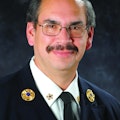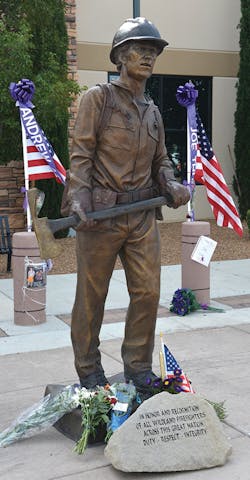Editor’s Note: The Firehouse staff wanted to share some of long-time Editor in Chief Harvey Eisner’s work. Harvey, a fixture on New York City firegrounds and at major events and conferences since the 1970s, passed away on Oct. 23. He was 59. He has worked with Firehouse since its inception in 1976. He began serving with the Tenafly, N.J., Fire Department in 1975 and served as chief for 12 years.
Apparently, 13 of the families whose loved ones from the Prescott, AZ, Granite Mountain Hotshots Crew were killed during a wind-driven fire on June 30, 2013, were unable to collect benefits from the City of Prescott at presstime because they were listed as seasonal employees. This doesn’t affect the other six firefighters, who were full-time employees. The problem lies in the fact that the seasonal employees did not contribute into a retirement system or pay premiums for life insurance or health benefits through the city.
People are upset and emotions are running high. Many citizens are asking why the City of Prescott does not provide these benefits. The 13 seasonal firefighters were not covered by the city’s health insurance program. The city did not make contributions on their behalf to the retirement system, so their survivors cannot collect. I am sure there are many who would like to do what they can for the families, but legally they cannot. One petition was started online so the family of one firefighter can collect benefits. A state legislator said he wanted to draft a retroactive bill so the State of Arizona would cover the additional costs. Members of the retirement system and health insurance who had been paying into their systems have a say about this. Work is being done to see what can be done and how the benefits can be funded in a way that it would stand up to a possible court challenge. At presstime, the issue had not been resolved.
You can bet that other fire departments in cities, counties and states across the country have similar rules that apply to firefighters, whether they are volunteer, seasonal, paid-on-call or members of combination departments. The time to figure out whether firefighters are covered is before a tragedy occurs, not after. States have different rules, so an analysis should be undertaken immediately to see whether your members are covered and, if not, what can be done to provide adequate coverage for their families if they aren’t here to provide for them.
There are specific rules for the distribution of federal funds when a firefighter dies in the line of duty. The Public Safety Officers Benefit (PSOB) Act of 1976 was initiated to provide $50,000 to survivors. There have been additional categories of emergency responders who have been added to the list of those eligible for benefits. There have been many revisions to the law, and today the benefit has steadily increased to $328, 612.73. Several hundred applications for federal benefits are reviewed by the Justice Department each year. There are apparently many rules and regulations that allow for an approval or disapproval of a claim. There can be complications in cases of marriages, divorces and other family changes, so having up-to-date beneficiary cards is important. No firefighter intends to respond to a call and not come back.
On April 17, 2013, two simultaneous explosions killed 15 people, including numerous firefighters. The blast was triggered by a fire in a fertilizer plant and caused a 2.1-magnitude earthquake that was felt 50 miles away and damaged a 37-block area of the town of West, TX, 70 miles southwest of Dallas. Recently more shocking news, three of the firefighters cited in a local newspaper after information was released about their autopsies. It has not been determined whether the information was released or leaked. If such information is leaked, that is illegal. That information should only go to the families and those having jurisdiction, no one else. A local newspaper released information that saying that several of the firefighters were killed by blunt-force trauma. The newspaper also contended that two of the firefighters had blood-alcohol levels that were over the legal driving limit and that another firefighter had traces of marijuana in his system. No one questions the bravery of those firefighters, but if those allegations are true, maybe it would have been better if they had not responded. Because of the circumstances, I am sure they went to help, as they always did.
Hopefully, firefighters don’t let themselves get into such a situation, especially volunteers, who may be responding from their homes or other places where drinking could take place. There’s too much to do at an emergency scene and too much to lose for anyone to respond in an impaired condition should something go wrong.
Think about it. Contributing Editor Mike Wilbur says that if you are at fault in an apparatus accident, that heaven forbid you were doing something you were not supposed to do, just bring your checkbook to court.
For comments and suggestions, please contact us at [email protected].
74
2013 firefighter line-of-duty deaths at press time
1,512
2013 civilian fire fatalities at press time
About the Author

Harvey Eisner
Editor Emeritus
HARVEY EISNER was named Editor Emeritus of Firehouse® after serving 15 years as Firehouse's Editor-in-Chief. He joined the Tenafly, NJ, Fire Department in 1975 and served as chief of department for 12 years. He was a firefighter in the Stillwater, OK, Fire Department for three years while attending Oklahoma State University. Eisner was an honorary assistant chief of the FDNY and program director for the Firehouse Expo, Firehouse World and Firehouse Central conferences. He covered many major fires and disasters and interviewed numerous fire service leaders for Firehouse®
